МИНИСТЕРСТВО ЛЕСНОГО ХОЗЯЙСТВА
И ОХРАНЫ ОБЪЕКТОВ ЖИВОТНОГО МИРА НИЖЕГОРОДСКОЙ ОБЛАСТИ
Государственное бюджетное профессиональное
образовательное учреждение Нижегородской области
«КРАСНОБАКОВСКИЙ ЛЕСНОЙ КОЛЛЕДЖ»
(ГБПОУ НО «КБЛК»)
МЕТОДИЧЕСКИЕ УКАЗАНИЯ
по дисциплине «Иностранный язык (Английский язык)»
для студентов I курса 2 часть
Тема 4. Описание жилища
Тема 5. Рабочий день и свободное время
Тема 6. Городская и сельская жизнь
Составили:
преподаватели
иностранного языка
Воронина М.В.,
Булкина Т.А.
Красные Баки
2022 год
Lesson 1
My House
№1. Read and translate the text:
My parents got married in 1983 when the Soviet Union still existed. As you know, at Soviet Union times almost all young couples were given flats free of charge, which looked absolutely similar. The same happened to my parents. They were given a three-roomed flat in one of the sleeping quarters of our town. But my mother tried to make our flat unlike the others.
There are three rooms, a hall, a kitchen, a bathroom, a toilet and two balconies in my flat. When you enter my flat, you appear in a long hall where you can find a set of wardrobes and a big mirror.
On the right hand there is a kitchen. Our kitchen is not very big but it is very cozy. There you can find all the appliances you need in a modern kitchen. There is a fridge, a gas cooker, a microwave oven, a food processor, a mixer, a coffee maker and so on. Also there is modern furniture, a kitchen table and four chairs. The walls are decorated with embroidered pictures. There is a big window in the kitchen and that’s why this room is always full of sunlight. My family likes to spend time in the kitchen because it is the warmest and the most comfortable place in my flat.
Going along the hall, you will enter a living room (also on the right hand). This room is my father’s favourite. He likes to have a rest there, lying on the sofa and watching TV. There is a set of wardrobes and bookcases on the right side of the room. On the left side there is a sofa, two armchairs and a coffee table between them. Also there is a big TV set in front of the sofa. There is a big window and a balcony in this room. My mother likes plants very much and that’s why this room and the balcony are full of plants.
Next to the living-room you can find a children’s room. It used to be my sister’s and my room but as my sister lives separately, this room is mine now. This is the smallest room in the flat but it doesn’t diminish its advantages. There is a wardrobe, a sofa, a bookcase, a desk with a computer on it and a dressing table. There is a fluffy carpet on the floor. There are posters on the walls and pot plants on the windowsill.
Our bathroom is painted in green colours. Our bathtub and a wash basin are yellow. Our towels and bathrobes are of different colours, the rug is blue, so that’s why when you enter this room you have an impression that you are inside a rainbow. The toilet-room is really very small. There is nothing except a toilet and a small cabinet next to it. So, let’s move to the last room in my flat. It is at the end of the hall on your left hand. This is my parents’ room. There is a double-bed, two bedside cabinets and a big wardrobe in this room. It is painted in warm colours and it is always a pleasure to rest there, reading a book or watching TV, which is on the wall. There is the second balcony in this room.
As they say, “My home is my castle”. So my home is a real castle for me and I don’t want to have another one.
№2. Answer the questions:
Have you a flat or a house?
Is your house/ flat big or small?
How many floors are there in the house/ flat?
What floor do you live on?
How many rooms are there in your house/flat?
What rooms have you got?
Has your house/flat got a cellar?
Is there a balcony in the house/flat?
Have you got a toilet and a bathroom in the house/flat?
Which room is the largest?
Which room is the smallest?
Where do people take off their coats and shoes?
Where do people cook dinner?
Where do we usually sleep?
Is it convenient to live on the ground floor? …on the top floor?
Is there a lift in your house/flat?
What modern conveniences are there in your flat (house)?
What furniture is there in the kitchen?
You have a room of your own, haven’t you?
Do you like your flat (house)? Why?
№3. Read the description of the rooms and guess what room is about.
The room is small. There is a bed, a mirror and a table there. We sleep there.
In this room there is a desk, a chair and an armchair, a sofa, a TV set and a carpet.
In this room there is a desk, bookshelves, a computer. You can do your homework or play there.
This room is large. In the middle of the room there is a big table. There are some chairs near the table. On the table there are cups, plates and spoons.
In this room you may wash your hands and face, clean your teeth.
There is a refrigerator, a stove and a cupboard in this room. We usually cook there.
This is not a room. There is no table there. There is a telephone and a chair. There is a mirror on the wall.
№4. Which word doesn’t fit:
1) a table, a desk, a sofa, nice, a chair.
2) a hall, a bathroom, a basement, a living room, a picture.
3) to clean the house, to watch TV set, to sweep the floor, to wash the sink in the
kitchen.
4) nice, big, round, square, a piano, cosy.
5) a refrigerator, a stove, a piano, a cupboard, a table.
№5. Divide all the words according to the names of the rooms:
A chair, a sofa, a bed, an armchair, a stove, a TV set, a carpet, flowers, a bookshelf, curtains, a table, a window, a chair, a video, a stereo, a desk, a computer, a wardrobe, a wall unit, a refrigerator, a piano, a mirror, a microwave oven, a balcony, a kettle, a plate, a cup, a spoon, a saucepan, a pan, a telephone, a shelf.
| Living-room | Kitchen | Bedroom | Dining-room | Hall |
| | | | | |
№6. Match the words to the correct houses. Translate the words.
a) a tent b) a camper van/a mobile home c) semi-detached houses d) a detached house
e) a terraced house/a row house f) a caravan g) a house boat
h) a flat / an apartment/a block of flats i) a hut j) a stilt house k) an igloo l) a cottage
m) a villa n) a mansion o) a castle p) a tepee/teepee/tipi q) a chalet r) a tree house
s) a windmill t) a lighthouse
| 1 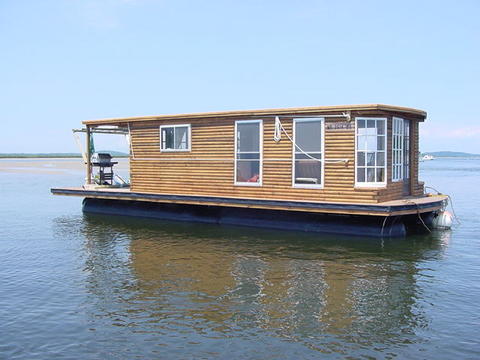
| 2 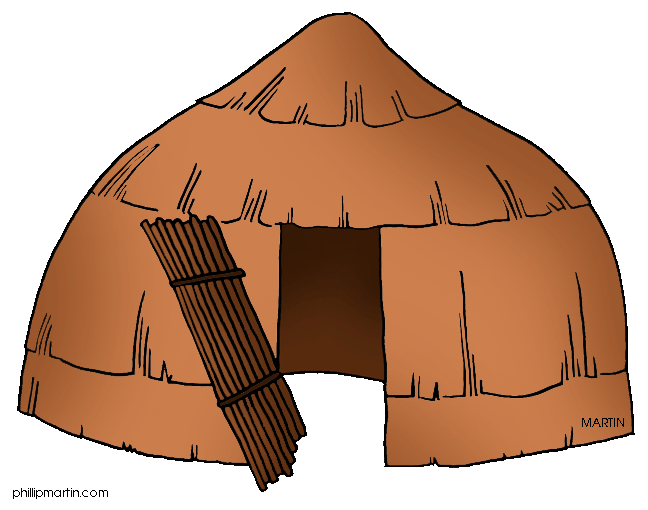
| 3
| 4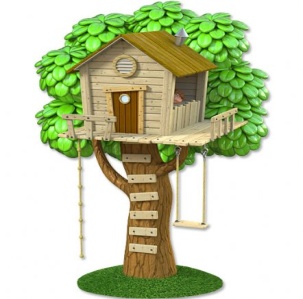
|
|
| 5 
| 6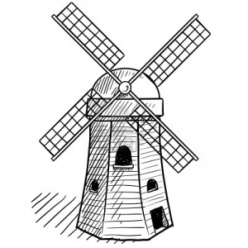 | 7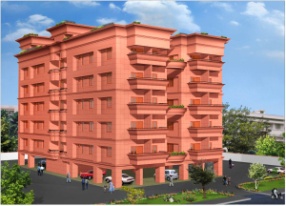 | 8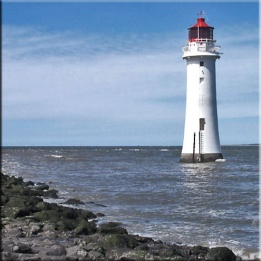 |
|
| 9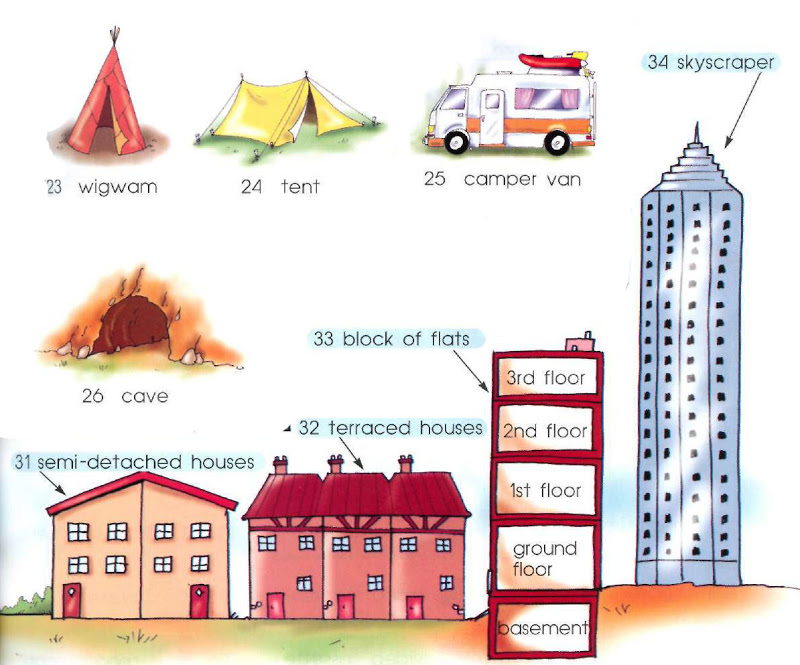
| 1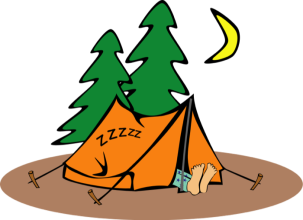 0 0 | 1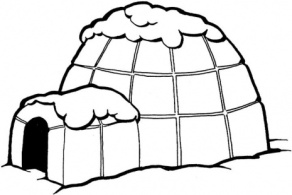 1 1 | 1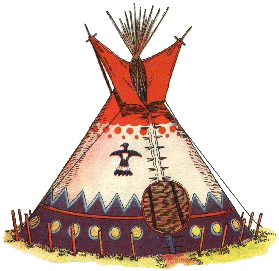 2 2 |
|
| 1 3 3
| 1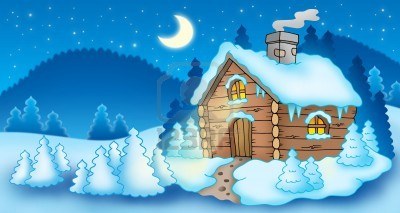 4 4 | 1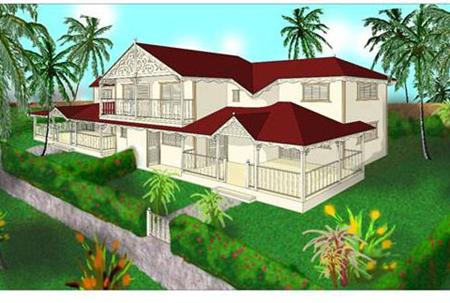 5 5 | 1 6 6 |
|
| 1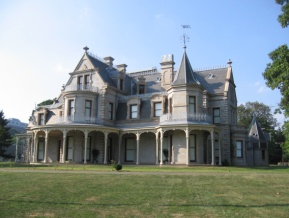 7 7
| 1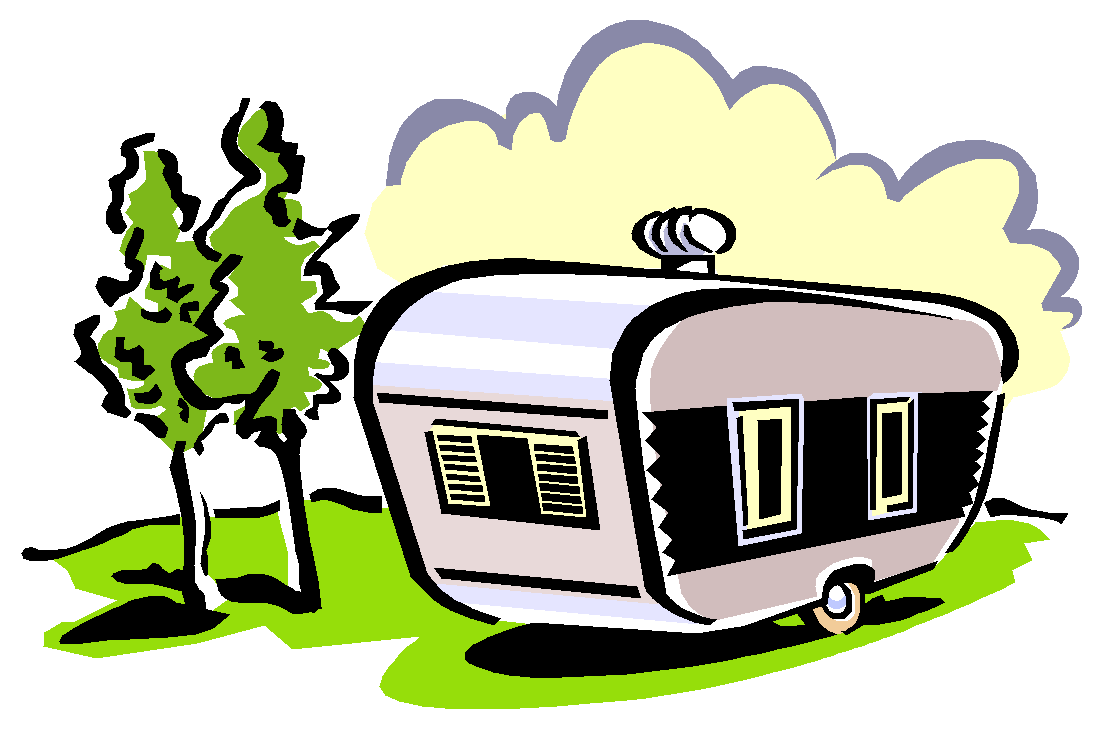 8 8 | 1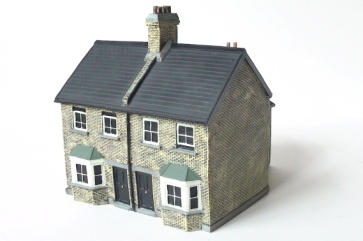 9 9 | 2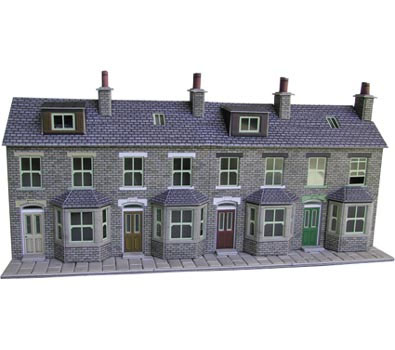 0 0 |
Lesson 2
Living conditions
№1. Translate the words:
Skyscraper, tall building, downtown, inhabitant, to decorate, to get engaged, engagement, suitable, to bother, two-storeyed, ground floor, lawn, basement, laundry, severe, gym.
№2. Read, translate the text “Houses in the USA” and answer the questions:
The USA is often pictured as a country of skyscrapers. In fact, it is not quite so. The tall buildings are located in the centre (downtown), housing offices of large firms, banks and shops. Real America begins with little cosy houses designed for one family with children. Each house has its own style and “face”; its inhabitants decorate it with love and care. Of course, young people usually don’t bother about having a house of their own until their mid-twenties, and prefer renting an apartment to buying a house. As soon as they get engaged, they start looking for a suitable house to live in. Engagement lasts from half a year to three years (sometimes even longer), but anyway by the age of thirty the young couple starts living in a house of their own.
A typical house is two-storeyed. On the ground floor a sitting room, a hall and a kitchen are situated, while upstairs there are bedrooms. A garage is downstairs. An American will say: “I live in a two-bedroom house” which means the house is not very large, or: “There are five bedrooms in my house”, which means the house is quite large. In front of the house there is usually a small garden or a lawn. In the basement there is often a laundry and sometimes even a gym! Winters are seldom severe in the USA, so the walls are not thick. The houses are built very quickly — it will take a building company three to four months to build a new house. Of course, there are all modern conveniences. The houses may be located rather far from the centre. Living far from the centre is not a problem as every family member has a car.
How does a typical American house look like?
How many stores does a typical house have?
What is there on the ground floor?
What is there upstairs?
What is usually in front of the house?
What is there in the basement?
Are there all modern conveniences?
Where are the houses located?
№3. Translate the words:
To influence, residential building, cloudy, therefore, light, century, upwards, convenient, windy, high steep roof, melting snow, to flow down, fireplace, feature, to differ, separate, floor, narrow staircase
№4. Read, translate the text “English Houses” and answer the questions:
The climate of a country is one of the factors that influence the style of its architecture. It can be best illustrated by British residential buildings. The weather in England is often cloudy and there are few sunny days in the winter season, therefore, as a rule, the windows in an English house are of a large size to catch as much light and sunshine as possible. In the houses built in the past century the windows, besides being large, opened upwards, which is very convenient on windy days.
Since there is much rain in England, typical British houses have high, steep roofs where rain water and melting snow can easily flow down. Most of the houses have a fireplace which forms the most characteristic feature of an English home and is seldom seen in other European countries.
The plan of an English house also differs from that of the houses where we live. English architects plan some apartments vertically instead of planning them horizontally, so that an English family having a separate apartment lives on two or sometimes three floors with rooms connected with a narrow staircase. They find it the most convenient style of apartment. There are usually three rooms in each apartment besides a kitchen and a bathroom: a living room, a bedroom and a dining room.
What’s the weather like in England?
What can you tell me about the windows in the English houses?
What kind of roofs do typical British houses have?
What is the most characteristic feature of an English home?
How does the plan of an English house differ from the house where we live?
How many rooms are there in each apartment?
№5. Study the material “There is/ There are”
Оборот there с личной формой глагола to be в английском языке употребляется очень часто и имеет значение есть, имеется, находится.
Глагол to be в этом обороте может употребляться в единственном и во множественном числе, и в разных временных формах:
| Tense | Singular | Plural |
| Present Simple | There is | There are |
| Past Simple | There was | There were |
| Future Simple | There will be | There will be |
Если английское предложение начинается с конструкции There is или There are на русский язык такое предложение следует переводить, начиная с конца:
There are four books in the bag. – В сумке четыре книги.
Если в предложении несколько подлежащих, то выбор формы глагола (is или are) определяется тем подлежащим, которое стоит первым: There is a pen, two books and a pencil in the bag. There are two books, a pen and a pencil in the bag.
Виды предложений
|
| Positive | Negative | Interrogative |
| Present Simple | There is a child in the room. | There is not a child in the room. | Is there a child in the room? |
| Past Simple | There was a child in the room. | There was not a child in the room. | Was there a child in the room? |
| Future Simple | There will be a child in the room. | There will not be a child in the room. | Will there be a child in the room? |
Исчисляемые существительные в единственном числе в отрицательной форме употребляется с неопределённым артиклем, а существительное во множественном числе или неисчисляемое существительное – со словом any.
There isn’t a book on the table.
There are not any books on the table.
There is not any water in the bottle.
Отрицательную форму можно образовать также с помощью местоимения no, которое ставится перед существительным. В этом случае существительное употребляется без артикля:
There is no flower in the vase.
There are no cats on the roof.
№6. Insert is or are.
There _____ two cups of tea on the table.
There _____ some milk in the cup.
There _____ an orange in the salad.
There _____ six balls in the box.
There _____ five chicks and a hen on the farm.
№7. Make negative and interrogative sentences
There are some new pupils in our group.
There were many old houses in our street.
There will be a conference next week.
There was nobody in the room.
There is something on the shelf.
№8. Write the sentences in Past Simple and Future Simple:
There is much snow in winter.
There are 5 theatres in our city.
There is no lift in our house.
There are many new books in our library.
There is little milk in the bottle.
There are 3 rooms in our flat.
Lesson 3
My college.
№1. Translate the words:
vocational education, student, teacher, grouptutor, monitor, department, full-time, part-time/correspondence, specialty, period (double-lesson, double-class), break, timetable/curriculum, register, credit test, scholarship, hostel, canteen.
№2. Read and translate the text:
My name is Alex. I study at the Forest College. I am a full-time student. I am in my first year now. There are full-time and part-time departments in our college. The academic session lasts 10 months. Our college trains specialists in many branches of knowledge. There are three specialties in the college: “Forest and park management”, “Maintenance and repair of engines, systems and aggregates of cars” and “Hotel business”.
Our college is very cosy and spacious. There is a large and light hall, a sport gym, a training room with sport heavy equipment on the ground floor. Many subject classrooms, a rich library and a reading hall are situated on the second floor. All the rooms of our college have modern equipment: computers, TV-sets, DVD-players and interactive boards. Not far from the college it is a hostel. It is a very comfortable and cosy four-storied building for the students. Opposite the college it is a club and a canteen. During the lunch-break we go there to have dinner.
Our periods begin at 8.15 and they are over at 16.25. Our period lasts 90 minutes. As a rule, we have three or four periods every day. We study many subjects at the college. We attend lectures, seminars and have practice. Some students who have only good and excellent marks get a scholarship. We go to college five days a week. Saturday and Sunday are our days off.
Our group consists of 25 students, including our monitor. Some our groupmates live in our hostel. As a rule, almost every student of our group comes to the college before the bell rings. So we can have a chat with each other. We usually have a lot of things to talk about. After periods everybody goes home to do homework. There are many different clubs and societies at our college. I attend a sport club and a dance club.
At the end of each semester we have test, credit tests and exams. When we have passed all the tests we start to prepare for the exams. After the exams a vacation comes. Now I can’t say that college life is a fascinating, fantastic experience. For the moment I can compare it only with a daily routine.
№3. Answer the questions:
Where do you study?
What specialty do you study?
Are you a part-time or a full-time student?
What year are you in now?
How many students are there in your group?
When do your periods start?
When do your periods finish?
What is your favourite subject?
Do you always attend your lectures?
Do you get a scholarship?
How often do you have exams and credit tests?
Do any of your friends live in a hostel?
№4. Translate the following expressions.
Учиться в колледже, посещать периоды, получать стипендию, проваливаться на экзамене, студента-заочника, принимать участие в общественных мероприятиях, быть на вершине группы, получать отличные оценки, жить в общежитии, товарище по группе, пропускать периоды, учебное заведение, преуспевать в предмете, готовиться к экзаменам, студент первого курса, академическая сессия.
№5. Give the short affirmative answer (+).
1) Has our college full-time and part-time departments?
2) Do our studies begin at 9 o’clock?
3) Do we usually have 5 periods a day?
№6. Give the short negative answer (-).
1) Is there a small reading-hall in our college?
2) Have our labs old equipment?
3) Will the academic session end in May?
№7. Study the material “Preposition of place”
Английские предлоги места можно поделить на две подгруппы – предлоги, указывающие на месторасположение и на движение.
Предлоги месторасположения:
in – всегда внутри чего-то;
on – на какой-либо (обычно более-менее) горизонтальной поверхности;
at – возле чего-то;
near – возле чего-то;
by – возле- чего-то;
Важно: предлоги at, near, by на первый взгляд имеют одинаковое значение, но at означает расстояние почти вплотную; near – предполагает близость с некоторой отдаленностью; by – подразумевает непосредственную близость, но в нижнем положении по отношению к говорящему.
between – показывает местонахождение между объектами или людьми;
beside – в стороне от чего-то или кого-то;
over и above – практически синонимы и обозначают положение «над»;
under – их антоним и означает «под»;
outside – обычно вне дома или помещения;
inside – внутри дома или помещения;
against – с опорой на что-то;
behind – позади кого-то/чего-то;
in front of – перед чем-то/кем-то;
ahead of – перед чем-то/кем-то (если объекты находятся более-менее на одной линии)
Предлоги, обозначающие движение
to – направление движения, часто с указанием конкретного места, но не вовнутрь;
into – предполагает движение вовнутрь;
from – показывает, откуда начинается движение, но это преимущественно отрытое пространство;
out of – движение из закрытых объектов.
№8. Fill in the spaces with the correct preposition
1) They went _______________ the party. (at, to)
2) The guests are sitting _______ the table. (at, above)
3) He walked ________________ the park. (for, to)
4) I am driving home __________ the bank. (at, from)
5) Keep the dog ______________ the furniture! (in, off)
6) The people are _____________ a party. (in, at)
7) Mary is sitting _____________ John. (at, near)
8) The dog is lying ____________ the floor. (at, on)
9) The man is sitting __________ the woman. (beside, to)
10) Their feet are _____________ the table. (through, under)
№9. Translate the sentences:
Что у тебя под столом?
Посмотри на часы на стене под картиной.
Я стоял в окружении толпы на концерте.
Игрушки лежат на полу.
Его поставили между двух девочек для традиционной фотографии.
Над городом тучи.
Он сейчас занимается в тренажерном зале.
Твоя шляпа на столе.
Lesson 4
Student’s Working Day
№1. Read and translate the text:
My usual working days look practically the same. But I do my best to make them more interesting and useful. Life is impossible without work. Teachers and parents always say that hard work is the only way to achieve our goals.
My working day usually starts like this. At exactly 6:00 my radio alarm buzzes. Though I am not a lazybones, in winter it is always difficult for me to wake up early. I do my morning exercises every morning. I know that good health is better than wealth. After having a shower, I get dressed and brush my hair. It takes me about 40 minutes. I am in the habit of having only a light breakfast. After breakfast I grab my school bag and rush for college. Unfortunately, I live far from the college. It takes me about one hour to get there.
Sometimes my mood depends on what classes I have. On some days lessons flash by very quickly, especially if they are on the humanities or Maths, which I like most, but they drag more slowly if they are on Chemistry or Biology and especially when we have to write tests on them. Our classes start at 8:20. Usually we have seven lessons a day. Each lesson lasts 45 minutes, but the breaks are too short: only 5 or 10 minutes. Fortunately, we have a large break in the middle of the day which lasts 45 minutes. During this break we go to the canteen.
At 3 o'clock, when the classes are over, I sometimes stay at college to play football with my groupmates. In the evenings I am busy doing my homework. If I have some free time left, I go for a walk with my friends, read or watch TV. At about 8 o'clock all our family have supper. At 11:30 I take a shower and go to bed.
№2. Complete the sentences with the appropriate words and phrases from the box.
Buzzes, wealth, busy, goal, hard, takes a shower, lazybones, cold water, canteen, gathers, flash by, to organize, health, lasts, to stay in bed
1. Life is impossible without … work.
2. Alexander tries … his working day well.
3. At 6:15 my alarm clock … .
4. I usually … as long as possible. Am I a … ?
5. Good … is better than … .
6. I wash my face with … .
7. In a common school every lesson … 40 minutes.
8. This weekend I am … doing my project.
9. At dinner all our family … at the kitchen table.
10. At 11 o'clock he … and goes to bed.
№3. Are these statements true or false? Correct the false ones.
1. Alexander's working day starts at 6:30.
2. He is in the habit of having a big breakfast.
3. Alexander's favourite subject is Maths.
4. In the middle of the day the students go to the canteen.
5. Alexander likes to play football.
6. In the evenings he goes for a walk with his friends.
№4. Answer the questions and tell about your working day:
1. When do you get up?
2. What do you do when you get up?
3. How much time does it take you to get ready for study?
4. When do you leave home?
5. How do you get to your college?
6. How much time does it takes you to get to your college?
7. How many lessons have you every day?
8. When are your lessons over?
9. When do you come home?
10. What do you do at home?
11. How do you spend your free time?
12. At what time do you go to bed?
№5. Раскройте скобки, употребите глагол в Present Simple:
1. Andrew (watch) some educational programmes in English.
2. My group mates (say) that I (dress) fashionably.
3. Parson (catch) the ball and (pass) to Roberts.
4. The seminar (finish) at 12:00.
5. Emma (dream) at the lesson.
6. Ivan (leave) college next year.
7. I (grab) his bag and (rush) to the bus stop.
8. I often (forget) my lunchbox at home.
№6. Study the material “Prepositions of Time”
on
- days (of the week) & dates:
on Sunday; on May 1st; on Christmas Eve; on my mark; on the weekend (AmE.)
in
- months / seasons / year
in summer / in July / in 2017
- part of the day
in the evening
- after a period of time
in an hour; in the future
at
- a specific point of time
at 11:15 p.m.; at half past six
- exceptions (when?)
at noon; at night; learned English at 42; at the weekend (BrE.); at first glance
since
- from a specific point in time until now (past till now)
since 1980; since yesterday
for
- over a certain period of time
for the first time in forever; for 3 years
ago
- from now to a specific point in the past (now till past)
a second ago; a decade ago; a while ago
during
- throughout the course or duration of smth.
during summer; during the vacation; during the discussion
before
- previous to in time; earlier than
before winter; before dawn; I have to talk to the client before I call my manager
after
- Subsequent in time; at a later time than
after midnight; after tomorrow
until (till)
- up to a certain point in time
until Monday; I’ll wait to call my manager until I hear from the client
to / past
- telling the time
ten to two (1:50) / ten past two (2:10)
from / to
- a starting point / an end point
from the beginning; from now to eternity
by
-not later than
by 12 o'clock; by next week
№7. Fill in the missing preposition of time:
Are you usually at home … 7 o'clock … the evenings?
Do you sometimes work … night?
What do you usually do … weekends?
Do you usually go shopping … Saturdays?
Do you go skiing … winter?
Our shop is open … 9 a.m. … 6 p.m.
Is there a holiday in your country … 6, January?
My granny was working as a doctor … the Great Patriotic war.
I’ll be done … five o’clock.
She regularly goes for a run … breakfast.
№8. Translate the word combinations:
на семь недель, за неделю, через час, за последние три месяца, во время войны, в ходе работы, до работы, после работы, с двух часов, до четырех часов, к трем часам, с 1980-го года, в 1945 году, в августе, в четыре часа, в понедельник, первого мая, утром, в полдень, ночью, в десять минут восьмого, в без десяти семь
№9. Learn by heart
My Working Day
I get up at 7 o’clock
When I hear Mother’s knock.
Then I wash and make my bed,
Then I have breakfast – tea and bread.
At 8 o’clock I go to school,
My bag is heavy. It is very full.
Lessons begin at quarter past 8,
Sometimes I come to school too late.
(I never come to school too late).
We have 4 periods every day,
“It’s hard to learn”, the students say.
At 4 o’clock the school is over,
It’s time for us to go home.
And after dinner I go for a walk,
With the friends I have a talk.
Then we play the games we like,
Very often we ride a bike.
I always do my home task
And answer well when (the) teachers ask.
Late at night I go to bed,
The day is over. It wasn’t bad.
Lesson 5
Hobbies
№1. Read and translate the text. Make a list of all the people’s activities mentioned in the text:
Alexander thinks that he has too many hobbies and too little time. He wants to share his concern with his friend Peter from Poland. As Peter is coming to Moscow only in two months’ time, Alexander decides to write him. But before writing an email, he puts his ideas in his diary:
“Nowadays it’s hard to name all the activities, entertainment and hobbies practiced by people in their free time. A growing number of people prefer watching films, performances, sporting events on TV to attending them. There exist quite different sorts of leisure activities which give thousands of people a sense of excitement and expectation. There are various pursuits that people choose to pass their free time. Today people spend hours watching Different informative, educational or environment programmes. Other popular occupations are surfing the Internet, playing computer games, listening to the radio, reading books (e-books), painting and so on. Many people prefer to go in for different kinds of sports and lead an active way of life. Sometimes they participate in competitions or contests and have a very good past time. There are people that prefer a calm way of spending their free time. They are fond of walks in parks or gardens. More serious people prefer to visit museums, art galleries or theaters.
Aerobics and shopping are two of the most popular pursuits for women. Cooking is also a very widespread activity among them. But nothing can be compared to your favorite hobby. A hobby is a special interest or activity that you do in your free time. Some people have animals as hobbies. They keep rabbits, or go fishing, or train dogs to do tricks. Some people are crazy about plants. They try to grow cacti or tropical flowers in their kitchens and sitting-rooms. Others are mad about their cars and motorbikes. They spend their Saturdays and Sundays washing them, painting them or buying new parts to make them go even faster. Many people make things as a hobby…
№2. Are these statements true or false? Correct the false ones.
Alexander writes in his diary a list of all activities, entertainments and hobbies practiced by people in their free time.
Alexander has no hobby and wants to select one.
He meets with his friends to discuss the problem.
Hobbies give people a sense of excitement and expectation.
Today people spend a lot of time watching different informative, educational or environment programmes.
Women prefer aerobics, shopping and cooking.
A hobby is an active pastime like sport or training dogs.
In order to relax most people prefer a calm way of spending their free time.
Animals can also be a hobby.
People prefer ready-made things to hand-made ones.
№3. Put the words under the following headings:
| knitting and sewing | drawing | cooking |
|
|
|
|
Watercolors, spoon, exhibition, wool, salt, album, frying pan, canvas, pattern, gas cooker, pencil, needle, food processor, sewing machine, cutting board, button, brush, scissors, knife, fabric, forceps, eraser, measuring tape, fork, mannequin, sketch, cotton, pepper, thread, paper, catalogue.
№4. Divide into 3 groups hobbies which are more suitable for men, for women and for both:
playing chess, mountain climbing, astrology, reading, model trains collecting, animal communication, playing football, knitting, horse riding, photography, yoga, parachuting, riding motorbikes, cooking, exploring volcanoes and underwater caves, sewing, travelling, dancing, fishing, computers, fashion, windsurfing, playing the piano, aerobics in the water, collecting postcards, diving.
№5. Guess what hobby is:
1. a sport in which you sail across water by standing on a board and holding onto a large sail
2. studying the movements and positions of the sun, moon, planets, and stars in the belief that they influence human behavior
3. an activity in which people jump head first into water, or move down under the water with special breathing equipment
4. a set of physical and mental exercises, originally from India, intended to give control over the body and mind
5. the skill or activity of making or repairing clothes or other things made from cloth
6. the act of making a picture with a pencil or pen
7. the activity of buying goods, especially from a store
8. activity of growing and taking care of the plants, and keeping it attractive
№6. Study the material “Infinitive”
Инфинитив (the Infinitive) – это неличная форма глагола, которая называет действие. Инфинитив является основной (или I) формой глагола и представляет глагол в словаре. Признаком инфинитива является частица to: to help – помогать, to read – читать.
Инфинитив употребляется без частицы to в следующих случаях:
You had better go now. – Лучше уйди / иди сейчас.
I must see you at once. – Мне надо сейчас же встретиться с тобой.
Инфинитив в форме действительного залога обозначает действие, произведённое лицом, выраженным в предложении подлежащим, а в страдательном залоге – действие, направленное на это лицо.
I like to help. – Я люблю помогать.
I like to be helped. – Я люблю, когда мне помогают.
Формы инфинитива
| Forms | Active | Passive |
| Indefinite | to write | to be written |
| Continuous | to be writing | – |
| Perfect | to have written | to have been written |
| Perfect Continuous | to have been writing | – |
№7. Open the brackets and translate the sentences:
1. I (to love, to read) and (to listen) to the music.
2. He (not to like, to play) chess.
3. We (to like, to correspond) with each other very much.
4. Bob (to hate, to wash the dishes).
5. We (to enjoy, to travel) round our country.
6. They (to like, to chat) with each other in the evenings.
7. Mary and her Mum (to love, to do shopping).
8. My parents (not to like, to go) to the theatre.
№8. Translate the sentences:
1. I’d like to go home early today.
2. It’s nice to be sitting here.
3. I’m glad to have left school.
4. He doesn’t like to be interrupted while he’s working.
5. I remember to have been asked this question.
6. I’d like to have been sitting there when she walked in.
7. She asked me not to forget to post the letter.
8. I was sorry not to have phoned you.
9. We must make careful plans.
10. I would rather go by myself.
№9. Write the sentences, underline the infinitive and translate each sentence:
1. I was surprised to see that you were here.
2. I did not forget to cancel that appointment.
3. With Roger here, I am never going to finish my work.
4. I wish that I could afford to get my hair cut.
5. I may decide to forgo dessert this evening.
6. If Ken remembers to buy tissues, it will be a miracle.
7. I have always wanted to learn how to cook.
8. He neglected to stir the pudding, and now it’s burnt.
9. He has decided not to pursue a career in the law.
10. The turtle I found refused to emerge from its shell
Lesson 6
Youth subculture and organizations
№1. Translate the meaning of the words:
1) Subculture is a group of people with beliefs, interests that are different from the rest of society.
2) Organization is an official group of people who work together for the same purpose such as a club, society, union, or business
№2. Read and translate the text:
Different young people express their individuality in various ways. Some people join cultural grouping or subculture, they behave in a specific manner. There are many groupings (subcultures) that have interests different from those of the mainstream culture. By the mid-60s, teenagers had begun to form distinct cultural groupings. Most young people follow some kind of youth culture: rocker, hacker, raver, skinhead, hippies, Goth, punk...
Some psychologists divide youth directions into three types: absolutely safe, potentially dangerous and posing a heightened threat.
Workers (street gymnasts, tourmen) - the name comes from the English “workout”, which means training. These positive guys are adherents of a healthy lifestyle. Their main goal – a beautiful pumped body, gaining strength and endurance.
The word “hipster” (from English “to be hip” – “to be in the subject”) was originally called the movement of jazz lovers. Hipsters do not represent life without advanced gadgets and devices. They get profiles in all popular social networks, keep personal blogs. It includes alternative music, avant-garde art, and art-house cinema.
Vanilla girls – a new interpretation of the image of Turgenev girls. Fragile romantic persons dreaming of book love and a beautiful prince. The main idea of the subculture is femininity in all its aspects. It is believed that this movement was a protest against the vulgarity and masculinity of modern girls.
Korean wave (Hallyu) - one of the most modern subcultures originated in South Korea. It consists of fans of Korean music groups (K-POP). Today, Hull is pushing the subculture of animeshniki (otaku) – fans of Japanese anime animation and manga comics.
The name “Goth” comes from the English “gothic”, which means “barbaric, rude.” Unlike previous peace-loving areas, the subculture is not as safe. She preaches destructive tendencies for the human psyche: black magic, gloomy pessimism, romantic perception of death are in honor.
Emo - another marginal teenage subculture has some similarities with the Goths. The same black color, the same idealization of death, the eternal theme of suicide. Emo is translated as emotional, the main painful point of this direction – excessive vulnerability, sensitivity, depression, withdrawal from the aggression of the modern world. They are fenced off from others even externally, hiding his face behind long beveled bangs.
Gamers - fans of this youth subculture see the meaning of life in a computer game. This is a whole world with its own slang, in which championships are organized with millions of prize pools. Jargon gamers, perhaps the richest among all modern subcultures. Many words have become familiar to Internet users, for example, “cosplay”, “bug” or “account”.
Freaks - subculture was formed in the 60s in America and has many interpretations. The freaks express themselves through art, the object of which is their own body. From English freak translates as “freak, eccentric.” In the past, people with mental or physical disabilities were called freaks. A modern freak is an extravagant person with a shocking behavior or appearance. He completely abandons the moral foundations of society and generally accepted behavioral stereotypes.
№3. Use the names of subcultures instead of pronouns:
hippies, goths, skinheads, tracers or parcour, punks, hackers,
1. They wear leather jacket, jeans and heavy boots. They propagandize superiority of one nation over another that provoke fights and criminal tendencies.
2. They are good at computers.
3. They like to talk about vampires and about the end of the world.
4. They refuse to accept everything and have unusual hairstyle.
5. They like nature and peace, love and friendship.
6. They should be very sporty. Their motto is “There are no borders, there are only barriers”.
№4. Answer the questions
1. What does the word subculture mean?
2. Why do some young people follow some kind of youth culture?
3. What youth subcultures do you know?
4. What youth groupings are peaceful?
5. What youth groupings are aggressive?
6. What youth groupings would you like to belong to?
№5. What positive and negative features do youth subcultures have? Divide them into two groups:
communication with friends, protest against the parents, shocking looks, common interests and spending spare time, new styles of music, rejection of everything and rebellion against the society, special way of life and self-expression, drug and alcohol addiction, changing the world to the best, teens’ violence and aggressiveness
№6. Study the material “Subjunctive Mood”
Сослагательное наклонение показывает, что действие рассматривается не как реальное, а как возможное, предполагаемое или желаемое. В английском языке существует две формы Subjunctive Mood: Subjunctive I и Subjunctive II.
Subjunctive I употребляется в простом предложении и в главном предложении сложноподчиненного предложения. Если высказывание относится к настоящему или будущему времени (Present Subjunctive), то форма Subjunctive I совпадает с формой Future in the Past: It’s a pity you can’t come tomorrow. Nick would help you. Жаль, что вы не можете прийти завтра. Ник бы вам помог.
Если высказывание относится к предшествующему периоду (Past Subjunctive), то форма сослагательного наклонения совпадает с формой Future Perfect in the Past: I am so sorry I had no money with me yesterday, I would have bought that shirt.
Subjunctive II употребляется в придаточном предложении. Форма Subjunctive II совпадает с формой Past Indefinite, если высказывание относится к настоящему или будущему времени, и с формой Past Perfect, если высказывание относится к предшествующему периоду: If I had any time now or tomorrow, I should do the work myself. If I had had any free time yesterday, I should have done the work myself.
Глагол to be имеет форму were для всех лиц в настоящем и будущем времени и had been для всех лиц в прошедшем времени: If I were rich, I shouldn’t work at all. If I had been there too, I could have seen the accident myself
В современном разговорном английском языке чаще употребляется was вместо were, который так же используется после if, if only, as if, I wish: If I was out of the city, I should take part in the outing. If he was not so ill he would accompany you.
В выражении if I were you глагол was не используется, а во второй части используется только should: If I were you, I should address him for help. He speaks English as well as if it were his native language. He speaks English as well as though he had lived in Britain.
№7. Write the sentences, using Present Subjunctive Mood:
1. If Jack were a polite man, he … in such a way. (not, to behave)
2. If Barbara … to my birthday party I would be so pleased. (to come)
3. If I weren’t tired I … you. (to join)
4. He … ill so often if he went in for sports. (not, to fall)
5. I would go to the sea-side if I … afford a holiday now. (can)
№8. Write the sentences, using Past Subjunctive Mood:
1. If I hadn’t been rude to him yesterday we … . (not, to quarrel)
2. If she … away some important papers I wouldn’t have been angry. (not, to throw)
3. I wouldn’t have taken a taxi if I … so much luggage. (not, to have)
4. He … his way if you had explained to him how to get there. (not, to lose)
5. They … if you had told them the truth. (to help)
№9. Put the verbs in the correct form
If my train (to be) late yesterday, I (to take) a taxi.
I (to go) to your party next Sunday if you (to invite) me.
I (to come) to see you yesterday evening if I (to have) enough time.
If it (to be) winter now, I (to skate).
She (to go) to the Crimea last summer if she (not to be) ill
№10. Make up the sentences using Subjunctive Mood:
She didn’t study well last year and received bad marks. — If …
He broke his bicycle and so he didn’t go to the country. — If…
She speaks English badly, she has no practice. — If…
I had a bad headache yesterday, that’s why I didn’t want to see you. — If…
They made a fire and the frightened wolves ran away. — If…
Lesson 7
Countryside or City
№1. Read and translate the text “Living in a City or a Village”
Sometimes you may think that city life is better than village life. However, there are many advantages and disadvantages of living either in a city or in a village. There are a lot of facilities for people in the city and they have more opportunities for making money. Children can get a good education. Living in a big city with a large population, you get used to making contacts and in this way you become more socialized. There are large shops, banks, offices, cinemas, hotels, clubs, hospitals etc. in and around a city. People have better transport facilities. There are the facilities of electricity, highways, communication, telecommunication and plumbing. So people can lead a comfortable and enjoyable life.
But there are some disadvantages too. The cost of living is very high in the city. Most goods and food products are expensive. There is no fresh air and pure water. The pace of life is high. The environment is polluted with dust, smoke, garbage and dioxide gases from factories. The streets are dusty and unclean. So it is hard to lead a healthy life. Many criminal activities often take place in the city. The city is always busy and noisy. There are a lot of vehicles and people on the roads.
There are also many advantages in village life. Generally, people there live in harmony and peace. They have more friends in the community since it is small. The village people always try to protect their traditional habits and culture. The village has clean air, less noise, pollution and rush, and the environment is very beautiful. The village has few vehicles, so roads are less dangerous for driving or cycling. People can easily get fresh vegetables, fruits, meat and milk.
Village life also has its bad points. Some people are not well-educated. Villagers' children go to the village school. They have difficulty in keeping up with new developments in their field or profession. They have to face many difficulties in their everyday lives, like travelling problems, entertainment and culture. They have to go to the city to supply some of their needs.
№2. Are these statements true or false? Correct the false ones.
1. City life is better than village life.
2. Village life has its bad points.
3. Living in a small community makes you more sociable.
4. The village has few vehicles, so people have better transport facilities.
5. The village has a quieter environment.
6. Village people have many difficulties, so it is hard to lead a healthy life.
7. Village people always try to protect their culture, so they have no cultural problems.
8. Roads in the village are safer for driving and cycling.
9. Plumbing facilities in the city provide people with pure water.
10. Fresh vegetables, fruits, meat and milk are not available in the city.
№3. Fill in the blanks.
1. There are a lot of … for people in the city and they have more opportunities for making money.
2. There are the facilities of electricity, highways, communication, telecommunication and … .
3. The environment is … with dust, smoke, garbage and dioxide gases from factories.
4. The city is always busy and … .
5. The village has … , so roads are less dangerous for driving or cycling.
6. They have … many difficulties in their everyday lives, like travelling problems, entertainment and culture.
7. They have to go to the city … some of their needs.
№4. Group the words and word combinations under the following headings: Countryside, City.
University, meadow, horse, lift, orchard, rubbish chute, block of flats, shopping mall, pig, field, metro, well, shepherd, central heating, theatre, harvest, trolleybus, milking machine, farm.
№5. Match the words to make word combinations.
| 1. traffic | a. hour |
| 2. rush | b. transport |
| 3. latest | c. facilities |
| 4. poor | d. accident |
| 5. fast | e. conveniences |
| 6. large | f. living conditions |
| 7. hard | g. air |
| 8. transport | h. worker |
| 9. fresh | i. technology |
| 10. modem | j. population |
№6. Match the proverbs
| 1) An Englishman's house is his castle. | a) Своя рубашка ближе к телу. |
| 2) East or West, home is best. | b) Тише едешь- дальше будешь. |
| 3) Burn not your house to rid it of the mouse | c) Мой дом - моя крепость. |
| 4) Charity begins at home | d) Всяк кулик в своем болоте велик. В своей семье всяк сам большой. |
| 5) Every dog is a lion at home | e) В гостях хорошо, а дома лучше. |
| 6) The furthest way about is the nearest way home | f) Осердясь на блох, да и шубу в печь. |
№7. Read, translate and remember:
Ask for -
Wait for -
Pay for -
Look for -
Apply for -
Apologize for -
Talk to -
Listen to -
Belong to -
Explain to -
Look at -
Laugh at -
Talk about -
Know about -
Dream about -
Remind of -
Accuse of -
№8. Underline the correct preposition:
1. Let’s talk … our future plans.
a) on b) about c) at
2. Remind Ann … her repot.
a) at b) about c) of
3. What are you dreaming …?
a) of b) for c) about
4. Don’t laugh … him!
a) for b) at c) with
5. Can you explain it … me?
a) for b) to c) at
6. Listen … the teacher attentively!
a) to b) by c) for
7. Can you wait … me at school?
a) with b) for c) by
8. I apologize … my rude words.
a) at b) by c) for
9. I’m looking … a pair of gloves.
a) for b) at c) with
№9. Fill in the correct preposition:
1. What are you dreaming … now?
2. I’m looking … my glasses.
3. Why are you accusing me … stealing money? I didn’t do it!
4. This magazine doesn’t belong … me.
5. What do you know … this new car?
6. This photo reminds me … my childhood.
7. Don’t laugh … him. He is a good boy.
8. Look … this advertisement! It’s beautiful!
9. Where could I pay … this suit?
10. Don’t wait … me. I have a lot of work to do.
11. Ask Andrew ... help. He knows these grammar rules.
12. Sam is applying … his first job.
13. Listen ... him attentively, he knows how this device works.
14. Look … the blackboard!
Lesson 8
How Do I Get There?
№1. Study the vocabulary and write your full address:
block – корпус
entrance –подъезд
highway –шоссе
embankment – набережная
lane –переулок
drive –проезд
dead-end street –тупик
settlement –поселок
village –село, деревня
autonomous district –автономный округ
postcode – почтовый индекс
Building (№) ….
Block …
Flat …
Entrance …
Floor …
Street ….
Settlement/Village/Town/City …
Region …
Autonomous District …
Postcode …
Country …
№2. Read and translate the text:
Today Alexander and his foreign friends are going to the rock concert “Music, help!” in the Polytechnic Museum. Alex lives on the outskirts of Moscow. He does not know how to get to this place, so he asks his father:
- Dad, can you tell me the way to the Polytechnic Museum? How can I get there quickly?
- Sure. It’s situated in the very centre of Moscow. Take the metro and get off at the Lubianka station. Then go up the stairs to the street. There is a square opposite the exit, called Novaya Ploshchad. The Polytechnic Museum is a big long building just in front of you. Go straight across the Square. It is behind the bus stop.
- Thanks, Dad.
Alexander goes to the local metro station. He leaves the entrance to his block of flats, walks along the side street, turns left and then right. It takes him only a ten-minute walk to get to the metro station. Alex goes down the stairs and takes a train. In forty minutes he is at the Lubianka station. He turns left to the escalator. Today the station is not so crowded. He goes up. He sees the old building of the Polytechnic Museum across the square and walks straight towards it. At the crossroads next to the Museum he meets with his friends – Peter, Jane and Nora. They are glad to see Alex. They come into Museum hall. The concert starts in a quarter of an hour.
№3. Are these statements true or false? Correct the false ones.
1. Alexander goes to the Polytechnic Museum for the first time.
2. He knows a quick way to get there.
3. He lives on the outskirts of Moscow and far from the metro station.
4. There are a lot of people at the Lubianka station.
5. The Polytechnic Museum is in Lubianskaya Ploshchad.
6. It’s a modern tall building.
7. There is a bus stop just in front of you.
8. His groupmates are at the entrance waiting for him.
9. The concert starts in fifteen minutes.
10. The friends want to attend this concert as they are fond of country music.
№4. Match the words and the pictures:
| 1 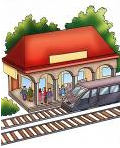 | 2  | 3  |
a. school
b. bridge
c. bus station
d. airport
e. hospital
f. museum
g. bank
h. stadium
i. railway station
j. fire station
k. hotel
l. post office
m. cinema
n. theatre
o. cafe |
| 4 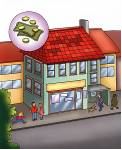 | 5 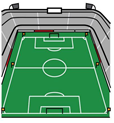 | 6  |
| 7 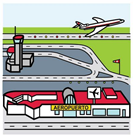 | 8 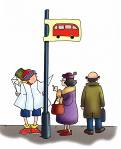 | 9 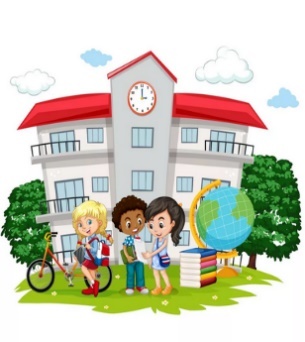 |
| 
10 | 11 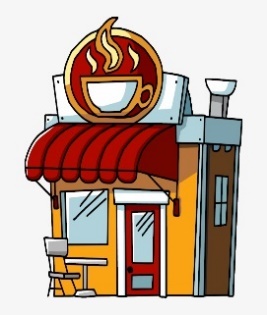 | 12 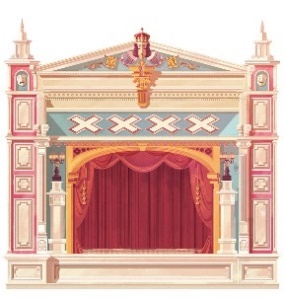 |
| 13 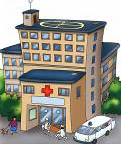 | 14 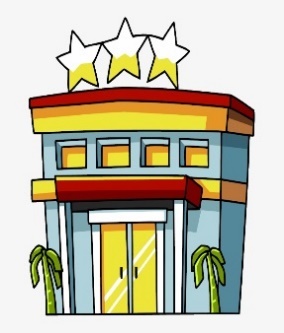 | 15 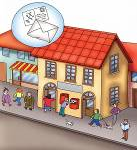 |
№5. Match the words with the correct definitions:
1. cinema a) park your car
2. disco b) eat and drink
3. post office c) change money
4. sports centre d) catch a plane
5. supermarket e) dance
6. hospital f) see paintings by famous artists
7. bank g) buy stamps
8. restaurant h) watch a play
9. car park i) see a film
10. airport j) catch a train
11. museum k) watch a football match
12. theatre l) buy fruit and vegetables
13. church m) pray
14. library n) report a robbery
15. market o) buy food, drinks and home articles
16. police station p) take the underground
17. underground station q) read a book
18. school r) have lessons
19. stadium s) have a surgery
20. rail station t) swim and play sports
№6. Study the material “Expressions of place and directions”
drive straight on along - ехать прямо по;
walk straight on - идти прямо вперёд;
go along - идти вдоль по;
stop next to - остановиться рядом с;
go across - пересечь;
cross over - перейти через;
turn round - развернуться;
turn off - свернуть с;
go down - спуститься вниз;
go up - подняться вверх;
walk through - пройти через, сквозь;
take a left turn - повернуть налево;
on the left - слева;
on the right - справа;
to the left - налево;
to the right - направо;
to the bottom - к низу;
to the top - кверху;
at the end of - в конце, на конце;
opposite- напротив;
on the other side of - на другой стороне;
forward - вперёд;
back -назад.
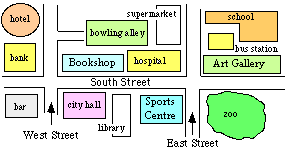 №7. Look at the map and answer the questions, using the preposition of place in brackets.
№7. Look at the map and answer the questions, using the preposition of place in brackets.
1. - Where is the Art Gallery? (between)
- It’s ….
2. - Where is the bowling alley? (behind)
3. - Where is the hotel? (next to)
4. - Where is the zoo? (opposite)
5. - Where is the hospital? (in front of)
№8. Use the information to practice asking and answering questions. i.e.
Example: Bank/Queen Street
- Excuse me, is the Bank near here?
- Yes, it is. The Bank is on Queen Street.
Post Office/Central Avenue
Bookstore/Ocean Way
Hospital/Dunlop Road
Park/Acorn Avenue
London School of English/St. Peter’s Street
Thompsons Department Store/Oxford Street
№9. Translate into English:
Корабль плыл из Ливерпуля в Нью-Йорк.
Я подошел к окошку и выглянул из него.
Самолет летел над облаками.
Он спустился с лестницы и подошел к столу.
Они перешли через дорогу и прошли под мостом.
№10. Insert the correct preposition: above, across, against, among, around, behind, towards, below, beneath, besides, onto, over, out of
The cowboy leant … the bar in the saloon, drinking a beer.
She took her purse … her bag and paid the taxi driver.
Our cat just loves to curl up … the fire and go to sleep.
The view from the top of the mountain was breathtaking. We could see the town and the river … us, and people who looked like ants.
Last night the temperature fell to three degrees … zero.
The burglar heard a noise coming from upstairs, so he hid … the curtains.
The dog jumped … my lap, and settled down for a good sleep.
The hunter froze as the tiger started running … him. He had nowhere to hide.
She has beautiful works of art all … her house, even in the kitchen and the bedroom.
These days, politicians like to walk … the crowds, shaking hands and saying one or two words.
He climbed … the wall and ran … the field.
The plane took off and was soon flying … the clouds.
Lesson 9
My native town
№1. Read and translate the text
Krasnye Baki
I was born in a settlement but I love it with all my heart. I liked to walk around, discover new places and hang out with my friends in the center of it. Today I know everything here. I have to say that in childhood I didn’t really like it. I wanted to move to another town. I wanted to live in a big city where I can meet new people every day. I really thought that my settlement was boring. But today I see how beautiful and interesting my settlement is.
My native settlement is Krasnye Baki. It was founded in 1617. Krasnye Baki is located on the Vetluga River. Its total area is about 6 square kilometers. The population is about 7320 people. Krasnye Baki is located 143 kilometers away from Nizhniy Novgorod, in north-east part of Nizhniy Novgorod region.
The territory of Krasnye Baki is small but it has such a variety of scenery. There are a lot of forests around our settlement. Many birds live in our forests. Near our Forest College there is a Dendrology Garden. In 1960, the Dendrology Garden was laid on an area of 14 hectares, where 300 species of plants grow today. It is a beautiful place where many people have a rest. We are proud of the beauty of our nature.
Krasnye Baki is famous for its historical and architectural buildings: the Church and the Historical Museum. The Church of Nicholas the Wonderworker was built in 1635. The Museum consists of two buildings. It is located in the historical center of the settlement, in Svoboda Square. Both buildings are near each other: the Trubetskoy House and the House of Stussie.
There are 2 colleges in Krasnye Baki: “Forest College” and “Technology and Economics College”. I study at Forest College. It was opened in 1947 as a forest school. In 1952, it was called a forest technical school. This building was built in 1970. And in 2012 our forest technical school became the Forest College. Opposite the Forest College there is a club and a canteen. Not far from the Forest College is a hostel. It is a four-storeyed building, very cosy and comfortable. Many students live there. There are 2 secondary schools in Krasnye Baki. The oldest school is the school №1. It was built in 1865. The school №2 was opened in 1992.
Sport is the favourite pastime of most children and teenagers in our settlement. So they go to Fitness and wellness complex "Bogatyr" to play football or basketball, to skate or to ski, to swim or to play bowling.
The best place in my settlement is the center. It is beautiful and always full of people. Teenagers often come here in the evenings. And when there is some celebration in our town, it’s always here in the center. There are some shops, cafes, administrative offices and bank here.
People of our settlement are very hospitable and friendly. As I said it’s not very big and everyone knows each other. I really like it. For me my hometown is the best. I was born and grew up here. I have many friends and relatives here. And in future I am sure wherever I go I will always come back in Krasnye Baki at least once in a year. Because a piece of my heart will stay here forever.
№2. Are these statements true or false? Correct the false ones.
1. In Krasnye Baki there are 2 secondary schools and 3 colleges.
2. The Museum consists of the Trubetskoy House and the House of Stussie.
3. The church of Nicholas the Wonderworker was built in 1635.
4. Our Fitness and wellness complex is "Three Bogatyrs"
5. The population is about eight thousand people.
№3. Answer the questions:
1. Where is Krasnye Baki located?
2. When was Krasnye Baki founded?
3. What is the population of the settlement?
4. When was the first school built in Krasnye Baki?
5. Do you like your hometown? Why?
6. Is your hometown a big or small?
7. Are there lots of shops and cafes?
8. Is there a cinema?
9. Is there a church in it?
10. What is your favourite place in your hometown? Why?
№4. Match the opposites. Create sentences with the opposites
noisy, clean, boring, cheap, dangerous, tourist, industrial, exciting, safe, quiet, busy, small, interesting, ugly, expensive, dirty, residencial, polluted, beautiful, crowded, comercial, peaceful.
№5. You have received a letter from your English-speaking pen-friend Jane who writes:
... We've moved to a new town. It's small and green. It’s located near the lake. My neighbours say that it hasn’t changed a bit for the last two centuries. Have you noticed any recent changes in your hometown? What are they? Do you like or dislike them? Why? Yesterday my mum went to her hometown ...
Write a letter to Jane. In your letter answer her questions, ask 3 questions about the trip to the mountains.
Don’t forget how to write a personal letter:
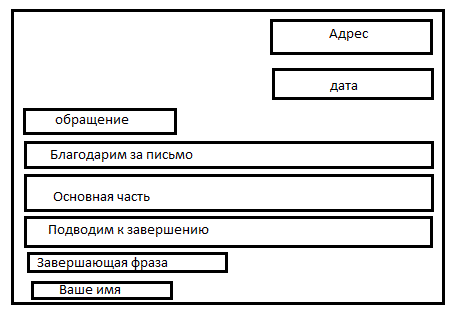
№6. Study the material “Special Questions”
Специальный вопрос задают для выяснения дополнительных сведений. Второе название специальных вопросов в английском языке — это «wh-question» (из-за букв, с которых они начинаются):
who — кто, кого, кому
what — что, какой
whose — чей
whom — кого, кому
which — который (из нескольких)
when — когда
where — где, куда (также where to)
how - как, каким образом
why - почему
how much — сколько
how often — как часто
how many — сколько (с исчисл. сущ.)
how long — как долго, сколько
Построение специального вопроса
| Вопросительное слово | Вспомогательный глагол или модальный глагол | Подлежащее | Сказуемое | Дополнение | Обстоятельство |
| места | времени |
| Why | do | you | go | with Kate | to college | on Friday? |
Построение специального вопроса к подлежащему происходит иначе. В английском языке вопрос к подлежащему мы задаем с помощью слов:
who — кто (для живых существ: людей, животных, птиц и т. д.)
what — что (для неживых предметов: растения, вещи, природа и т. д.)
Для построения такого вопроса, мы берем утвердительное предложение и вместо действующего лица на первое место ставим who/what.
Например: Who goes to college every day? What was broken?
№7. Put the words in the right order.
1. when / start / competitions / your / do?
3. in / popular / kind / of transport / what / is / China / a?
4. she / does not / why / the hospital / take / the metro / to get to?
5. he / does / play / football / how often?
№8. Ask special questions to the sentences beginning with the words given in brackets
Some children do stupid things. (why?)
I am looking for my watch (what?)
His penfriend lives in London. (where?)
We met after school yesterday. (when?)
She'll come to the party. (with whom?)
№9. Put questions to the words in the italics:
1. Kate likes to walk along streets in good weather.
2. You need to turn to the right.
3. His father leaves his car in the street.
4. Alex has his English lessons three times a week.
5. He drives fast.
















 0
0 1
1 2
2 3
3 4
4 5
5 6
6 7
7 8
8 9
9 0
0














 №7. Look at the map and answer the questions, using the preposition of place in brackets.
№7. Look at the map and answer the questions, using the preposition of place in brackets.


















